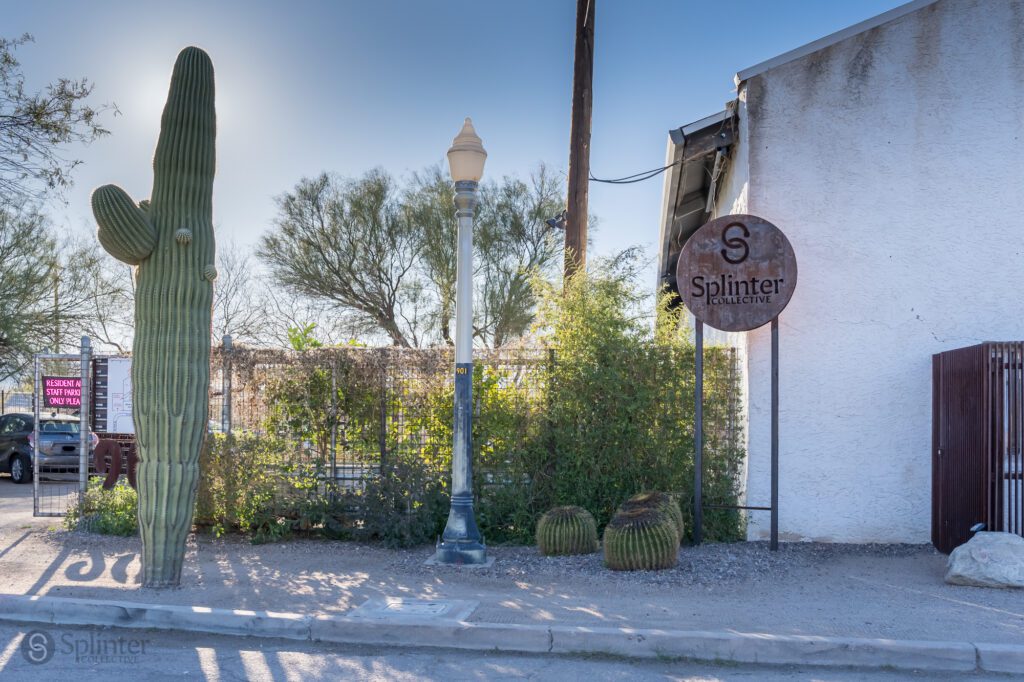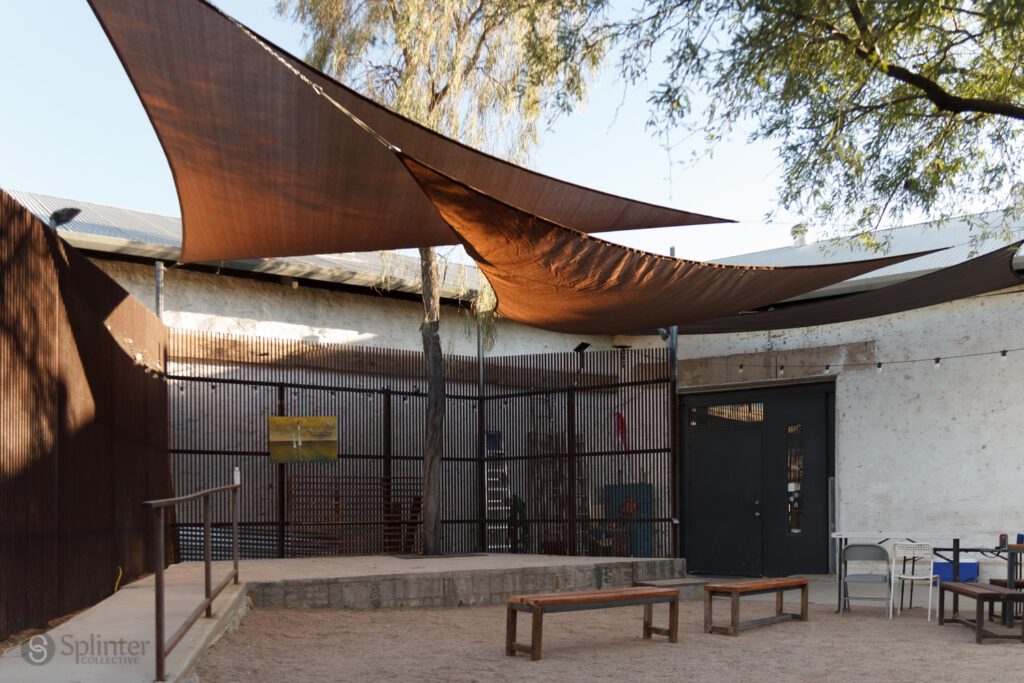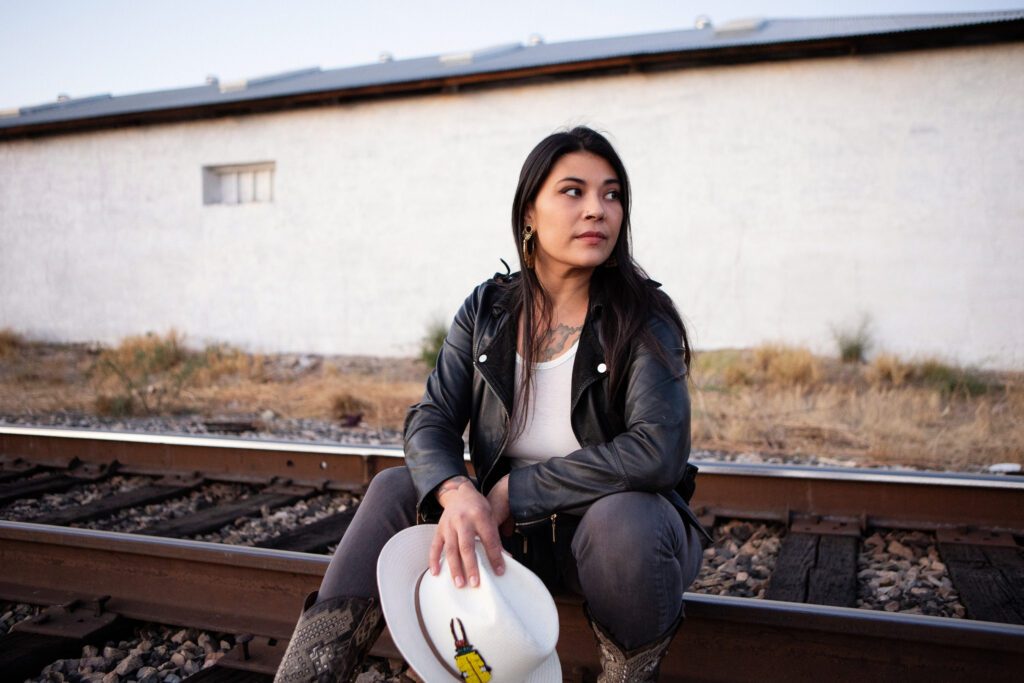
About Splinter Collective
Splinter Collective is a vibrant community space housed in an historic Adobe warehouse located in Cukson, or Tucson, AZ on occupied Tohono O’odham, Yoeme, Pascua Yaqui and Hohokam lands. The warehouse was originally built in 1920 to store farm equipment and has evolved many times over the years. It sits on the border of the Dunbar Spring and Barrio Anita neighborhoods just northwest of the historic arts warehouse district. It has been in the hands of artists since the 1960s and has held legendary rent parties and concerts. We love to hear your stories — drop us a line if you have them!
Our mission statement:
Splinter Art and Community Fund, our 501c3 non-profit (DBA Splinter Collective, or Splinter) is a horizontally led organization that is 100% comprised of Black, Indigenous and people of the global majority and LGBTQ+ and we aim to provide a safe, accessible and equitable physical and community space for liberatory art practices and social justice organizing.
We focus on community events, art curation, housing justice, and providing mutual aid to the surrounding community — in particular our unsheltered neighbors. By centering marginalized voices and experiences, nurturing community building across divisions and cultivating deeply representative leadership, Splinter strives to be a model of partnership, inclusivity, diversity, and abolition.
Acknowledging our place in space, and understanding our role in our neighborhood is central to our mission and identity. As an art and social justice organization, Splinter is deeply committed to anti-racism, decolonization, community partnership, mutual aid, anti-capitalism, housing justice, disability justice, addressing climate change, anti-gentrification, eviction defense and promotion of the arts.
We center the voices and artistic visions of marginalized communities and art geared towards social change. We are thrilled to include and support in particular LGBTQIA+ artists, women artists, disabled artists, BIPOC artists, border artists, our unsheltered neighbors, and other community groups.
We practice radical hospitality by offering subsidized rent to certain community events and benefits. We reinvest into improving the space to be more inclusive and accessible and paying our staff a living wage. We will always put people before capital, and planet before profit. We believe in the radical redistribution of goods and care. We have a free store in front of the property, come bring things and take things! Splinter actively organizes with, builds community with, and employs folks living outside and in nearby encampments to build collective power and assert that housing is a human right.
Check out our project, The Tucson Alliance for Housing justice at http://tucsonhousingjustice.org for more.
Splinter Art and Community Fund is a registered 501c3 non-profit, our FEIN is 86-1918619 and all donations are tax-deductible.
We believe that private property is a colonial concept, and while we must live in the world we do, we try to change the way that feels in this corner of the world. Space rentals at under market retail rates directly support improving the space to be more inclusive and our ability to continue to offer it as a community resource.
We hope to replicate the model in the future and be able to offer arts grants and a residency program.
We honor the lands we occupy, and the labor of all those workers past, present, and future who built and maintain the space. We honor the legacy of all the artists who brought their visions and talents to these walls. We honor people in all of their complexity and hope to anchor a place of safety and belonging.

About the Directors
Natalie Brewster Nguyen is an accomplished performance and installation artist, writer, educator, and community activist. Nat collectively serves, alongside the Brain Trust, as the manager and curator of the space.
Additionally, Natalie is one of the Co-Executive Directors of the non-profit wing.
Nat is joined by two Co-Executive Directors, Sam Bloom and Jess Rite, who each share in the pride of horizontal-leadership and shaping the organization’s endeavors. Jess and Sam both have long histories of community engagement, political organizing, and involvement with the arts world.
Nat also co-founded a social justice consulting company called Justice Movement. Justice Movement collaborates with the Tucson Alliance for Housing Justice, one of Splinter’s primary projects that offers allyship courses around housing and ownership.
@justicemovement.org_ on Instagram
https://www.justicemovement.org

Nat can be found @NatalieBrewsterNguyen on all social media
http://nataliebrewsternguyen.com
History
If the walls of the Splinter Bros Warehouse could talk, they would have many stories to tell about the building’s past incarnations.
The Ronstadt family built the adobe warehouse 90 years ago. It served as a storage facility for items ranging from fur coats to medical supplies for St. Mary’s Hospital. High school proms were held there in the ’80s. But it is most remembered from the legendary 1970’s “rent parties” which enshrined the warehouse as an experimental arts collective.
Presently, there are eleven art studios, many areas for site-specific installations and an outdoor stage and garden dedicated to the realization of performance art.
Excerpted from Irene Messina. The Tucson Weekly.


